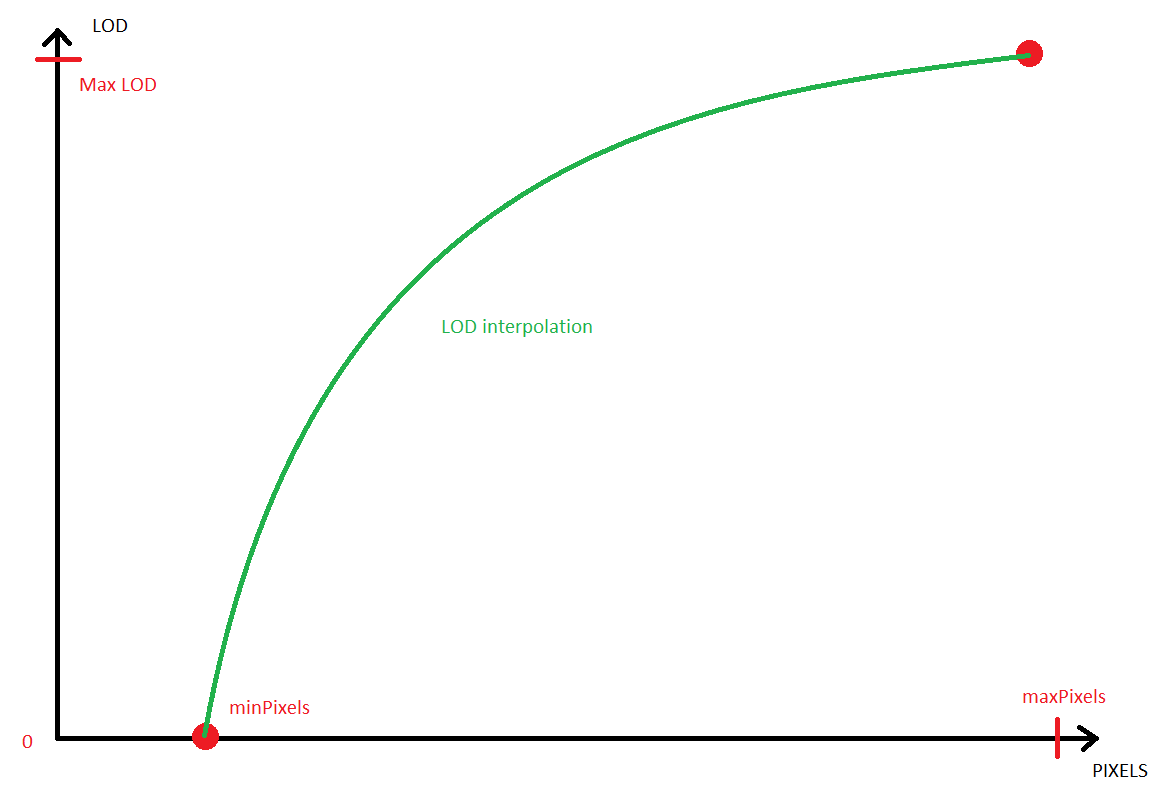Starting with ODA SDKs version 21.4, OdGiProgressiveMesh can automatically select the level of detail (LOD) by calling the OdGiProgressiveMesh::selectLOD() method.
OdGiProgressiveMesh supports mechanisms of LOD selection that are described in the enumeration OdGiProgressiveMesh::ProgressiveMeshAutoSelectLOD for both custom (user-defined) and interpolation selections.
Interpolation LOD selection
OdGiProgressiveMesh::kSqrInterpolation and OdGiProgressiveMesh::kSqrtInterpolation provide two methods of interpolation LOD selection.
These methods use OdGiViewport to recalculate the mesh extents’ diagonal in pixels. Then they use two threshold values: minPixels and maxPixels. If the recalculated diagonal length is less than the minPixels value, LOD 0 (minimal) is used. If the recalculated diagonal length is greater than the maxPixels value, numLODs() (maximum) is used. For other cases, these methods interpolate LOD between these two points: (minPixel, LOD 0) and (maxPixel, numLODs).

OdGiProgressiveMesh::kSqrInterpolation uses square interpolation: LOD = A * diagonal * diagonal + B. Since the square function grows fast, this method tries to keep a less detailed presentation of a mesh and gives better performance, but some visual simplification defects may be visible.
OdGiProgressiveMesh::kSqrtInterpolation uses square root interpolation: LOD = A * sqrt(diagonal) + B. This method presents a more detailed mesh, so visual simplification defects should be invisible. However, the mesh may be “too detailed” for a specified view, so performance may be lower.
Options for interpolation LOD
The OdGiProgressiveMesh class has a new setAutoSelectLODOptions() method that specifies an instance of the OdGiProgressiveMeshAutoLODSelectOptions class for interpolation LOD selection. This class defines minPixels and maxPixels interpolation thresholds:
OdUInt32 maxPixels() const;
OdUInt32 minPixels() const;
Custom LOD selection
The OdGiProgressiveMesh class also provides for custom (user-defined) LOD selection: OdGiProgressiveMesh::kCustom. Before using this selection, an instance of OdGiProgressiveMeshAutoLODSelectCallback should be implemented and specified using the OdGiProgressiveMesh::setCustomLODAutoSelectCallback() method.
The implemented callback method should return an appropriate level of detail for the progressive mesh as an OdUInt32 value from interval [0, numLODs()]:
virtual OdUInt32 selectLOD( const OdGiProgressiveMesh* pPM, const OdGiViewport* pView, const OdGeMatrix3d* pModelToWorldTransform ) const = 0;
All values outside of the interval are treated as errors and the level of detail is not switched.
Custom LOD example
The OdGiProgressiveMesh class does not provide linear interpolation for the level of detail. However, you can add it using a custom level of detail selection:
class OdGiLinearLODInterpolation : public OdGiProgressiveMeshAutoLODSelectCallback
{
public:
OdUInt32 selectLOD( const OdGiProgressiveMesh* pPM, const OdGiViewport* pView, const OdGeMatrix3d* pModelToWorldTransform )
{
//Obtain extents diagonal
double D = pPM->extents().diagonal().length();
//Obtain viewport scales
OdGePoint2d scale;
pView->getNumPixelsInUnitSquare( pView->getCameraLocation(), scale, pView->isPerspective() );
double maxDim = scale.x > scale.y ? scale.x : scale.y;
//Scale diagonal
maxDim *= D;
//Interpolation options
OdUInt32 minPx = pPM->autoSelectLODOptions().minPixels();
OdUInt32 maxPx = pPM->autoSelectLODOptions().maxPixels();
//Check interpolation interval
if( maxDim < minPx ) return 0; //Less that minimum - always minimum LOD
if( maxDim > maxPx ) return pPM->numLODs(); //More than maximum - always maximum LOD
//Interpolation: LOD = A * pixels + B, where 0 = A * minPx + B and numLODs = A * maxPx + B
double A = (double)( pPM->numLODs() ) / (double)( maxPx - minPx );
double B = -1.0 * A * minPx;
return (OdUInt32)( A * maxDim + B );
}
};
…
OdGiLinearLODInterpolation* linearLODInterpolation = new OdGiLinearLODInterpolation();
pPM->setCustomLODAutoSelectCallback( linearLODInterpolation );
pPM->selectLOD( OdGiProgressiveMesh::kCustom, pViewport );
The next article in this series will describe how to use the new automatic LOD selection in Visualize SDK.


